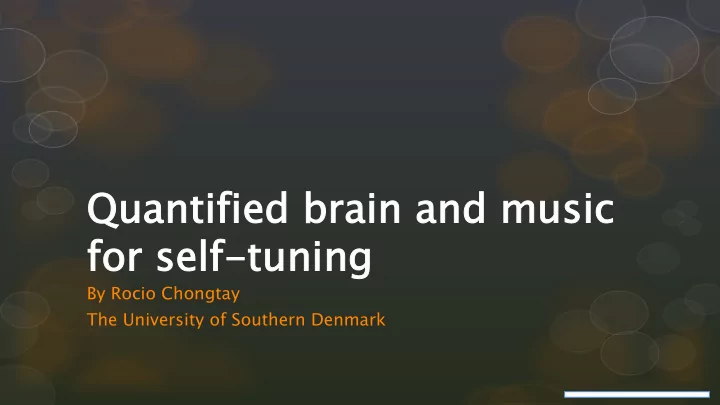

Quanti tified brain and music for self-tu tuning By Rocio Chongtay The University of Southern Denmark
Concentration and Music I was studying for my final exams for a Master in Artificial Intelligence and had problems concentrating if There was noise around It was too silent If I listened to music with lyrics or catchy beats
Concentration and Music I realized then that certain type of music helps me to concentrate. A pleasant background noise to cancel the outside distractions. Music without lyrics or catchy beats that make you feel like dancing.
I work with Brain-Computer Interfaces (BCI) like: Single dry EEG sensor Mindwave mobile from Neurosky concentration relaxation By measuring brain electrical activity can give some indicators of levels concentration and relaxation
We built a brain controlled artifact that uses brain waves to change the speed of a fan The higher the concentration level the faster the fan spins and the ”world” is lifted
I was surprised to see many people having difficulties concentrating.
Music and Self Tuning I found out that certain music ”tunes” me for better performance in reading. I have also found out that other type of music ”tunes” me for better performance in other activities like programming or sports. But how to find the playlists that ”tune” me best for different activities?
I decided to use the BCI to quantify my concentration and relaxation levels while listening to different music and while performing different activities to find my self tuning tunes.
I used the BrainWave Visualizer program by Neurosky For recording indicators of concentration (attention) and relaxation (meditation) while listening to different music. Music Concentration Relaxation
High concentration but low relaxation Song: Hotel Intro by Moby Album: Hotel
Good level of concentration and relaxation Song: Beautiful by Moby Album: Hotel
High level of concentration with low relaxation Song: Raining Again by Moby Album: Hotel
Full song recording Higher relaxation than concentration
The recording settings for working activities: I recorded 2hrs morning sessions of concentrated reading working 1 hr listening to Moby – Hotel 1 hr listening to a selection of classical music I also recorded 2hrs afternoon sessions of more easy reading or programming with the reverse order 1 hr classical music 1 hr Moby - Hotel
Higher concentration than relaxation (played on 1st hr)
Second half higher relaxation than concentration (played on the 2nd hour)
Higher concentration than relaxation, only at the end higher relaxation and very low concentration (falling sleep)
Self-tuning for other activities: For a good performance in archery I need a good level of concentration and some level of relaxation.... but not too relaxed
After quantifying my brain I found these self-tuning tunes: For concentrated work/reading – Play list with classical music (even commercial CD’s with ”Music to Read”) work for me. For practising Archery – Best performance with Moby – album ”Hotel” For Programming – Playlists with high beat pop/ electrical music
Self-tuning effect in archery Without music With Moby – Hotel music Shots at 18 mts
Self-tuning effect in archery Without music With Moby – Hotel music Shots at 70 mts
Music taste and tuning is personal Once I identify my ”ideal” playlists, I find that by playing them it feels easier to get into the desired mindset, This is what I call self-tuning.
“I had no room now for this fear, or for any other fear, because I was filled to the brim with music.” - Oliver Sacks- Thanks! rocio@sdu.dk
Recommend
More recommend